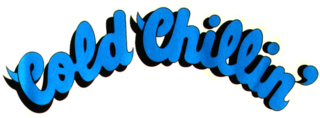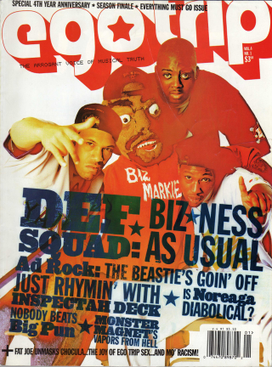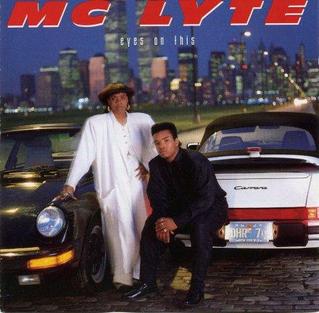
Marlon Lu'Ree Williams, better known by his stage name Marley Marl, is an American DJ, record producer, rapper and record label founder, primarily operating in hip hop music. Marlon grew up in Queensbridge housing projects located in Queens, New York. He performed in local talent shows during the early days of rap music, further fueling his interest.

Lolita Shante Gooden, better known by her stage name Roxanne Shante, is an American rapper. She first gained attention through the Roxanne Wars and was part of the Juice Crew. The 2017 film Roxanne Roxanne is a dramatization of Shante's life.

Nathaniel Thomas Wilson, better known by his stage name Kool G Rap, is an American rapper. He began his career in the mid-1980s as one half of the group Kool G Rap & DJ Polo and as a member of the Juice Crew. He is widely considered to be one of the most influential and skilled MCs of all time, and a pioneer of mafioso rap/street/hardcore content and multisyllabic rhyming. On his album The Giancana Story, he stated that the "G" in his name stands for "Giancana", but on other occasions he has stated that it stands for "Genius".

Rawkus Records was an American hip hop record label, owned by James Murdoch, known for starting the careers of many rappers. Rawkus started in 1995 with releases in hip-hop, drum and bass and fun-dustrial.

Shawn Moltke, better known by his stage name MC Shan, is an American rapper, singer and record producer from New York City. He is best known for his guest appearance and production on Canadian singer Snow's 1992 single "Informer", which peaked atop the Billboard Hot 100. Shan is also known for his 1986 single "The Bridge," which was produced by Marley Marl and entered the Hot R&B/Hip-Hop Songs chart.

Long Live the Kane is the debut album by American rapper Big Daddy Kane, released by Cold Chillin' Records on June 21, 1988. It was produced by Marley Marl and established both as premier artists during hip hop's golden age. Kane displayed his unique rapping technique while covering topics including love, Afrocentricity and his rapping prowess. Marley Marl and Big Daddy Kane display a sparse production style - creating beats with fast-paced drums and lightly utilized James Brown samples.
The Bridge Wars was a hip-hop music rivalry during the mid-to-late 1980s and early 1990s, that arose from a dispute over the true birthplace of hip-hop music and retaliation over the rejecting of a record for airplay. The Bridge Wars originally involved the South Bronx's Boogie Down Productions, led by KRS-One, and Marley Marl's Juice Crew, hailing from Queensbridge. KRS-One and Marley Marl have since officially retired the feud, with the release of their collaborative 2007 album hip-hop Lives.

The Juice Crew was an American hip hop collective made up largely of Queensbridge, New York–based artists in the mid-to-late 1980s. Founded by radio DJ Mr. Magic, and housed by Tyrone Williams' record label Cold Chillin' Records, the Juice Crew helped introduce New School artists MC Shan, Big Daddy Kane, Biz Markie, Roxanne Shante, Masta Ace, Tragedy, Craig G and Kool G Rap. The crew produced many answer records and engaged with numerous "beefs" – primarily with rival radio jock Kool DJ Red Alert and the South Bronx's Boogie Down Productions, as well as the "posse cut", "The Symphony".

Percy Lee Chapman, known by his stage name Tragedy Khadafi, is an American rapper and record producer. Chapman hails from the Queensbridge Housing Projects in Queens, New York City, and helped spawn other hip hop artists such as Mobb Deep, Capone-N-Noreaga, Nas. He is documented to be the first to use the phrase "illmatic" in 1988 on a record called "The Rebel", from the Marley Marl album In Control, Volume 1, which was an inspiration and influence on fellow New York rapper Nas.

Soundbombing II is the second installment in Rawkus Records' Soundbombing compilation series, released by the label on May 18, 1999. Mixed by DJ Babu and J Rocc of Beat Junkies, the album included tracks from a variety of artists, both Rawkus' signees and popular artists from other labels.

Cold Chillin' Records was a record label that released music during the golden age of hip hop from the late 1980s to the early 1990s. A producer-and-crew label founded by manager Tyrone Williams and run by Len Fichtelberg, most of the label's releases were by members of the Juice Crew, a loosely knit group of artists centered on producer Marley Marl. In 1998, the label shut down, and the majority of its expansive catalog was bought by Massachusetts-based LandSpeed Records.

Road to the Riches is the debut album by hip hop duo Kool G Rap & DJ Polo, which was released in 1989 on then-prominent hip hop label Cold Chillin' Records. The album is notable for being one of the blueprints for the mafioso rap trend with the title track "Road to the Riches," which received strong rotation on the TV show Yo! MTV Raps, and was later featured on the old-school hip hop radio station Playback FM from the game Grand Theft Auto: San Andreas. Most of the songs, however, are not crime-related. Other popular songs included "It's a Demo" and "Poison." In 1998, Road to the Riches was selected as one of The Source's "100 Best Albums".

Lyricist Lounge 2 is the fourth hip hop compilation album by American record label Rawkus Records. It was released on November 28, 2000, as the second installment of Lyricist Lounge album series, based on New York's Lyricist Lounge showcases.

Ego Trip was a hip hop magazine started in New York City in 1994. It lasted four years and 13 issues and distinguished itself based on its irreverence and defiant attitude, eventually adopting the tagline, "the arrogant voice of musical truth."
Screwball is an American underground hip hop quartet from New York City, composed of rappers Hostyle, KL, Blaq Poet and Solo. The group has released two studio albums, Y2K: The Album in 1999 and Loyalty in 2001, and a compilation album Screwed Up in 2004.

In Control, Volume 1 is the debut studio album by American hip hop record producer Marley Marl, of the Juice Crew. It was released on September 20, 1988, through Cold Chillin' Records with distribution via Warner Bros. Records.

Eyes on This is the second studio album by American hip hop recording artist MC Lyte. It was released on October 3, 1989, via First Priority and Atlantic Records, and featured production from Audio Two, as well as Grand Puba, The King of Chill, Marley Marl and PMD.

"The Symphony" is a rap song produced by Marley Marl featuring Juice Crew members Masta Ace, Kool G Rap, Craig G and Big Daddy Kane. The track appears on Marley Marl's 1988 Cold Chillin' Records release In Control, Volume 1. Rolling Stone ranked "The Symphony" the 48th greatest hip-hop song of all time, calling it "the first truly great posse cut".

Soundbombing is a hip hop compilation album by Rawkus Records, released on October 14, 1997. The album helped launch the careers of Mos Def and Reflection Eternal, who later became Rawkus's most popular artists. Soundbombing is regarded as a "scene-defining" underground hip hop album.

In Control Volume II (For Your Steering Pleasure) is the second studio album by American hip hop record producer Marley Marl. It was released on October 1, 1991, via Cold Chillin' Records. Recording sessions took place at Marley's House Of Hits in Chestnut Ridge, New York. Production was handled by Marley Marl himself, with Benny Medina, Francesca Spero and Tyrone Williams serving as executive producers. It features guest appearances from Tragedy Khadafi, Big Daddy Kane, Craig G, Heavy D, Kool G Rap and Masta Ace, who contributed on In Control, Volume 1, as well as Big Money Wiz, Chubb Rock, Chuck D, Def Jef, Eclipse, Grand Puba, Kev-E-Kev & AK-B, King Tee, Little Daddy Shane, LL Cool J, MC Amazing, MC Cash, Mike Nice, Nexx Phase, Perfection, Portia Kirkland, Pure Cane Sugar, Rap Industry For Social Evolution and The Flex. Action, Biz Markie, MC Shan and Roxanne Shanté did not appear on this album.


















